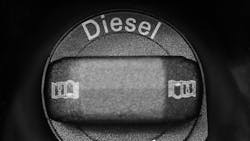When a technology has been around for a long time, it is more challenging to make sweeping improvements. But that doesn't mean it can't be improved. You just have to look at diesel-powered trucks and the SuperTruck program to see that it is possible to improve an existing technology.
If you are unfamiliar with the SuperTruck program, it is a public-private partnership between the Department of Energy and truck makers. With SuperTruck 2, the DOE asked OEMs to achieve a 100% improvement in freight efficiency over their 2009 baseline numbers.
Two OEMs—Navistar and Volvo—recently announced that their SuperTruck 2 vehicles had improved freight efficiency beyond 100%. They did this in various ways, including making the trucks more aerodynamic, using trailer gap fairing, trailer skirts, and trailer rear-end devices. In addition, they reduced both vehicle weight and rolling resistance.
"Partnering with DOE for the SuperTruck program provides an exciting opportunity to push the technology envelope to see what's technically possible for heavy-duty transportation and which solutions can be scaled into production, but equally important, which solutions don't work for scaled production," Peter Voorhoeve, president of Volvo Trucks North America, said in a press release.
See also: Volvo SuperTruck 2 uses aerodynamics, advanced engineering to top 12 mpg
Some people think the SuperTruck program is a pie-in-a-sky effort. But we know many of the technologies from SuperTruck 1 have found their way into today's trucks and are making them more efficient than their predecessors. As an official SuperTruck 1 and 2 program reviewer for over a decade, I have watched this happen in real time. Advanced cruise control, aerodynamic details, and lightweighting were analyzed, designed, and implemented directly from these efforts.
"Our goal is to continue to advance internal combustion engine technology as efficiently and sustainably as possible until there is parity with zero-emissions vehicles," Dean Opperman, chief engineer of advanced truck for Navistar, said in a press release.
Trucking is in a period of transition—the messy middle—where fleets use various powertrains in their operations. They are doing so because they strive to operate as efficiently as possible. Diesels are still the predominant powertrain, and they will likely remain so over the next several years as the industry works to mitigate some of the challenges that alternative fuels present. It's exciting to see the work being done to continue improving diesel's efficiency. Spoiler alert: These efforts help extend the range of diesel's alternative fuel cousins, making them even more valuable.
About the Author

Michael Roeth
Executive Director
Michael Roeth is the executive director of the North American Council for Freight Efficiency. He serves on the second National Academy of Sciences Committee on Technologies and Approaches for Reducing the Fuel Consumption of Medium and Heavy-Duty Vehicles and has held various positions with Navistar and Behr/Cummins.
